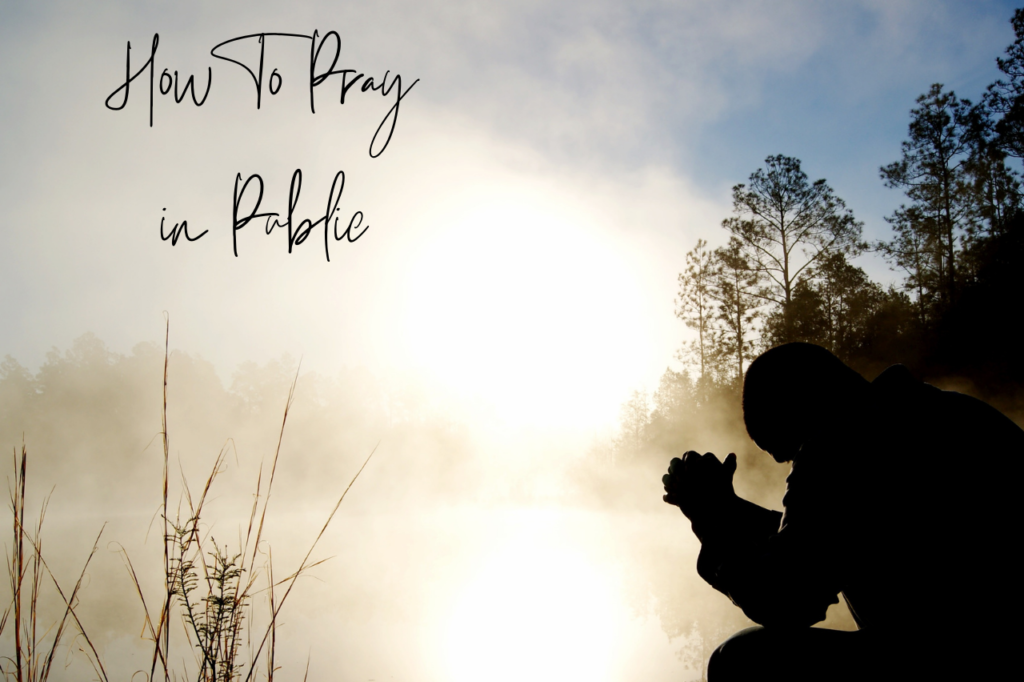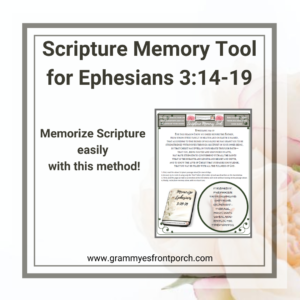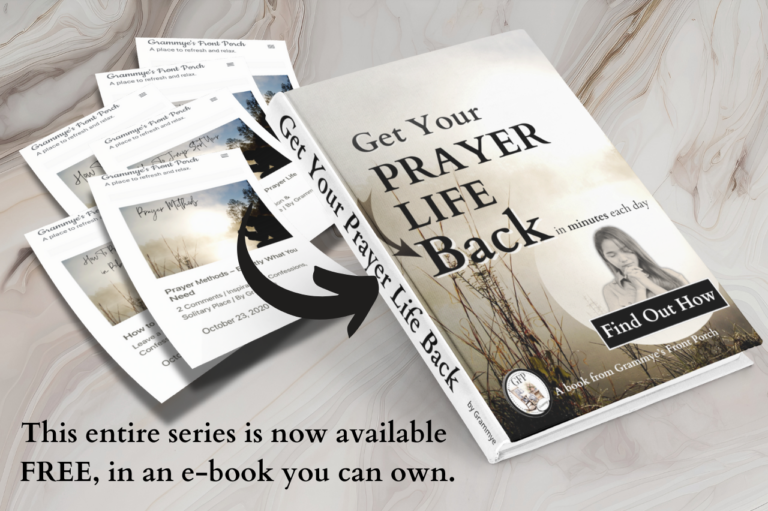October 30, 2020
(Updated for the public September 2024)
Reveal the secrets to leading prayer for others without nervousness. Facts, examples, and resources on how to pray in public with confidence! Find out about this simple sequence that can guide your spoken prayers.
(This topic is #5 in a series. The list of all the posts in the series is at the end.)
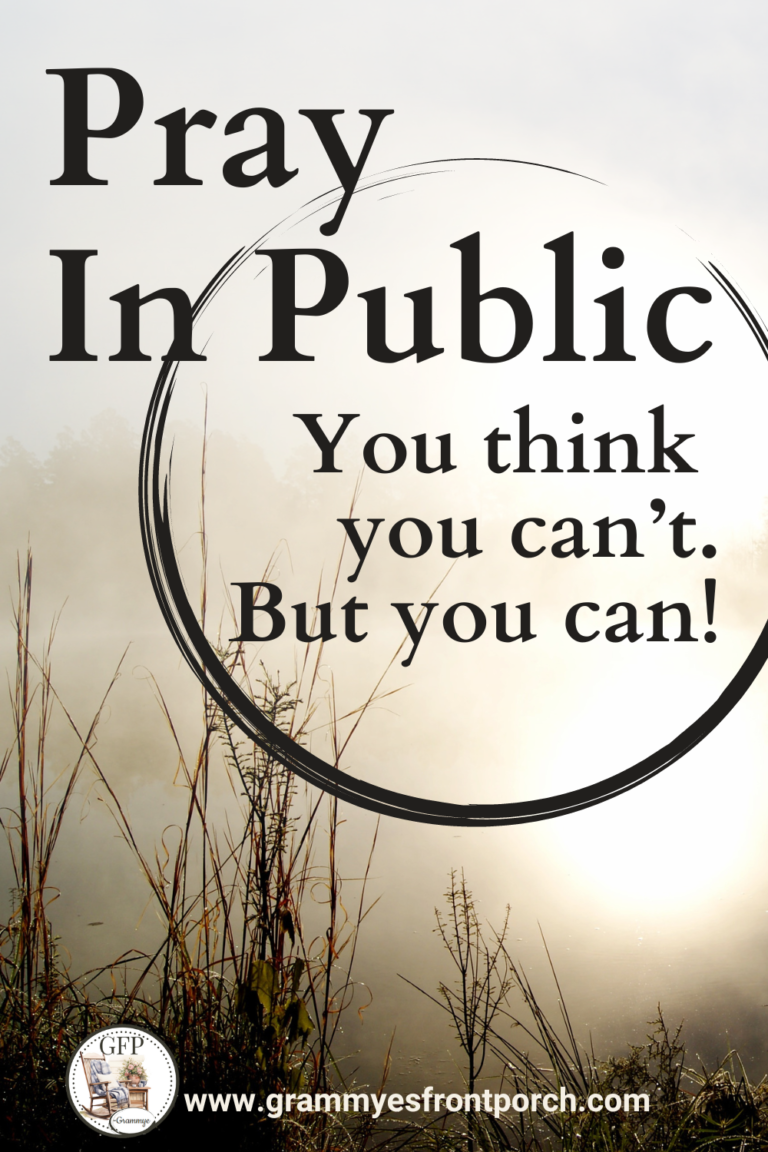
How To Pray In Public With Confidence
Let’s just go ahead and admit that when we are called to lead a prayer, often we feel judged somehow by those around us. Perhaps we are afraid a more educated or experienced person might lead it differently, might be more confident, etc.. Maybe we are afraid our nervousness will show. Or we are awkward speaking in public, and sometimes falter over our words.
Are these the things that give you that little heart-racing feeling?
Suppose we take a hard look at the whole picture — the audience we fear, the uncertainty we feel, and the God we face. Suppose we frame the whole thing within Scripture, and examine the original purpose of praying for others.
Suppose we discover that the task is way less intimidating than we thought.
BEFORE WE BEGIN, LET’S DISPEL SOME OF THE FALSE IDEOLOGY THAT HAS CREPT INTO OUR THINKING.
You think it hasn’t happened, but sometimes it’s pretty sneaky.
Sometimes it’s good to be sure we’re not bringing the expectations we subconsciously adopted from somewhere else.
Here are some ideas our generations have experienced as a society:
Genie in a bottle. A world of funny jokes, and even a whole TV series in the past. You remember? It was the story of a beautiful genie who grants wishes and even eventually marries her “master.” I’d say his dreams probably came true.
Santa. How many generations have enjoyed the act of asking for things and receiving them from a mysterious and completely forgiving stranger who exists only to hear our requests and give us our desires.
Birthday candles. Silly, but we actually insist on closed eyes and blowing them all out in order for the wish to “come true.”
Thanksgiving. Is it “Thanksgiving”? Or “Wealthcounting”? Please, people, no general “thankfulness” to the vague and unknown universe. Please don’t get me started on this. I’ve got a few sayings. One is this: “You can’t thank nobody.” You know what I mean by this?
You just can’t thank “Nobody.” It’s not possible. If good luck came your way, it’s just chance, not by design. If you want to be happy about your fortunes, by all means please do. Be happy, even excited. But if you want to be thankful, there has to be a giver. If you’re thanking, you have to thank “Somebody.”
Whew. Sorry. That one always gets me out of breath.
Now, one more.
Halloween. Halloween can be troubling. It’s a time when what is evil is “laughed away” as funny or safe, and we find ourselves participating in rituals that touch on celebrations we would never approve of in another setting.
That’s a pretty good list of examples.
Why Is This Reflection Necessary?
We’re looking at all these traditions only to remind ourselves that some of those ideas have crept quietly into our thinking, and into the thinking of others around us. These rituals are things we have come to embrace. They become memories, traditions, and we can be fond of them.
But they tend to muddy the waters and even contaminate our prayer life, as we slip into a mindset that focuses on our desires and how we might achieve (or receive) them.
Not trying to ruin your fun, even though I probably will in some way. Sorry. And I’m really not trying to criticize your family celebrations. It’s just something you want to be sure you see clearly. Because…
If you’re not careful, prayer becomes one more request to present to the mysterious stranger who grants wishes.
Making the conscious effort to separate these things is our first step toward looking at prayer with a more pure focus. When we pray…
- We need to be sure that our requests aren’t to fulfill our selfish fantasies.
- We need to recognize that closed eyes will not guarantee our wishes are granted. (By the way, neither will adding the words “In Jesus name” at the end.)
- We need to come before the Lord in reverence, taking seriously the division of good and evil.
You may feel this is not your problem, you didn’t see yourself there, and you aren’t sure this help topic will truly help. But now we’re done with that, so stick around…
Remember, we just got here. This was simply shedding our coat at the door. Just putting down what we wear in the world, to come into the presence of the Lord.
Now we can freely examine the foundation of prayer, the knowledge that will allow us to responsibly pray for a group.
Group prayer can be the same as intimate personal prayer. It can also be different. And it feels like you can get lost in those woods. Today you will get a map that gets you out of the woods. It consists of three words. That’s all. A three-word sequence that can drive you comfortably and safely through the forest.
So stick with me for a few minutes for the journey to a better mindset about prayer.
(And there’s a bonus — a few more places to look if you still have unanswered questions.)
HOW TO PRAY IN PUBLIC —
MAKING SURE WE ARE RIGHT
Isn’t this the worst? Feeling like we might say something wrong, maybe that something we say is seen as unBiblical, or incorrect? How can we be sure?
After all, isn’t everybody else a little further along? Maybe we shouldn’t expect to know about praying. Especially praying for others.
First, here’s a big truth for all of us:
There’s no absolute pivot-point in your faith, a moment when you say that yesterday you didn’t know how to pray in public with confidence but today you do. There just isn’t. There’s no single point in time that you change from a less-knowledgeable believer to a more-knowledgeable one. You gradually grow, stretch, and challenge over a long time, realizing that the more knowledge you gain, the more there is ahead.
But how is it that some can stand before a crowd and pray so beautifully and appropriately, and we know deep down we would be terrified?
And is it fear that’s holding us back?
Here’s the thing:
That fear is almost always about what the other people will think. Not even that God will be displeased. We are afraid of being judged by others.
Let’s begin, and find out right away that there’s a way to step out of the spotlight and continue with confidence.
Starting Out With A Clear Focus
For the benefit of those around you, speak slowly, clearly, thoughtfully. Take your time, calm yourself and others with quiet brief pauses. And don’t feel the need to use King James words. Just be you.
Leading is scary for some of us. It doesn’t come naturally. This is one wonderful occasion in which leadership means humbly switching attention from ourselves to someone else. That can be so freeing for shy people.
In your thoughts and your words, the first step in any prayer is to turn our human eyes to God. It helps you, and it helps others, to acknowledge the presence of God — the very person of God present in the room, receiving the attention of everyone.
This initial part of your prayer is the signal to you and to others that what is said next is a group message to a Holy God. You are officially not speaking to the crowd. You are speaking to God.
We first address God as our present King, here in our midst.
It might sound like this aloud: “Father, we turn our hearts fully to you in this moment, the one who has been with us from the beginning. We put down our distractions and look to you. We acknowledge your majesty and your glory in this moment, and we worship you.”
Other worshipers are now facing the same direction as you. Now we are all looking at someone else. Together you now carry your message to the Lord. Once you plant the focus squarely on him, there’s no “audience” for you to fear.


What To Say To God Next
Once we have focused our attention on the glory of the Lord, faithful people almost have a reflex of being thankful.
There is a beauty in acknowledging God’s presence, and a humility in acknowledging what he has provided. It’s always appropriate to express thanksgiving for all that God has done. In fact, it makes sense to take the position of thankfulness before asking for anything.
Somehow each stage of prayer bends us a little further toward submission.
- First to stop all our frantic thinking and acknowledge God’s presence.
- Then to admit that every blessing received came directly from him.
We express our gratitude to the God who provides.
It’s usually impossible to address each person’s individual circumstances in a crowd.
If the plan is to include specific circumstances, certainly you can allow a moment for some to speak aloud, and in a casual setting this is wonderfully interactive.
Alternatively you could ask for those items in advance, write them down, and speak them yourself.
However, if time or circumstances don’t really seem like this should be done, try to capture a general thought that everyone could embrace.
Your prayer might sound like this: “Father, you have designed our lives and our days, you have provided for our needs, and you have blessed us. Every good and perfect gift comes from you. We praise you for your faithfulness to us.”
Now you are easily strolling down the pathway of speaking with God. It’s not the rocky cliff you imagined. It’s the green pastures and still waters, the place of companionship.
If it’s hard, try to remember that God is familiar, he knows you. He is your companion all the time. He’s not a stranger.


THE REST OF YOUR PRAYER
So we’ve talked about two stages.
It seems like beginning the message and being thankful are two of many steps, but in today’s story there is just one more. Only three steps. Is that somehow relieving? That you’re already to the last step?
We have acknowledged God’s presence, and we have thanked him for his provision.
The rest of our time with him consists of acknowledging his will.
Instead of perching on his knee with our wish list, we must somehow package our requests in an acceptable presentation.
This is the “surrender to his will” posture we often struggle with. Are we humble enough? Bold enough?
We are entering the heart of our prayer, the reason we gathered. And suddenly we see our unworthiness. What do we say?
Praying within God’s providence is the objective, and the main portion of our prayer.
😧 You think you need something more. A lot more. You’re afraid you don’t know how to “pray within God’s providence.” How could anyone even know that?
Even reading this, you know it’s true. Your heart rate is increasing.
😧 You tell yourself that you cannot do it. You think you can’t enter this prayer without a complete and memorized knowledge of the entire Bible. Certainly you can’t do it now, not until you have many more years of study and learning.
😧 Your worry? What you don’t know! Perhaps this is the distant knowledge you are afraid you don’t possess. This is what separates you from “the-ones-who-know-what-you-do-not”.
Panic is ushered in on these ideas, and those thoughts take over.
😧 The illusion is created. You’re certain of this: others know what to ask for, and how to ask. You don’t. You haven’t had your pivot point yet. (The one that doesn’t exist, right?😉)
Slow down.
Would you be comforted to find out there’s no need to panic? That your fears are bigger than the reality?
Would you like a clear direction on how to appropriately make requests?
There’s a way to think about this to get it right. It’s not even that hard. It’s really about perspective.
Just a way to think about it.
Try to envision God’s will as a vessel in which we place all our trust, all our hope, all our needs. This is one way to keep our requests appropriate. If he holds out the vessel, and we deposit our prayers, our hands are empty. That’s actually scary, but it’s how it really is.
Our requests are contained, because God’s will is bigger than everything else. God’s providence is the plan for the whole world, for every person, for every moment.
It doesn’t mean we can’t plead. We can and we do.
It does mean our requests, even the desperate ones, are deposited into the vessel that is his providence. He holds it now, and we wait.
To pray within God’s providence, your prayer might sound like this, “God, we come before you today with heavy needs, asking for mercy and relief. We press you to give us a cure, do-over, comfort, change, all these. We ask you to respond to your children, and to keep us in your holy and perfect will. Give us humble hearts, and willingness to follow you in all things. Bless our obedience, our ministry, and our witness. Forgive our sin, and give us hearts of mercy for others. Preserve us for the day of glory, and hold us tightly in your almighty hand.”
Our duty is to put it into the vessel, and you just did. You don’t have to give him step-by-step instructions, and you don’t have to insist on an immediate answer. Ask for blessings, guidance, healing, even miracles. Ask for something specific, or for something big, whatever you have brought. Always acknowledging this: It’s a request only he can grant, if he wants to. (And we will say just a little more about this when we talk about closing our prayer.)
God’s Will.
God’s will is the subject of countless questions, many studies, and much teaching. It is mysterious and obscure when we are in despair.
But the more we know about God, the more we learn about his will. Scripture consistently and reliably reveals it in instruction, history, and testimonies. We have to dedicate ourselves to learning more, reading our Bible, to grow our faith in him. It is our duty and our privilege.
While we are learning, and we always are, we just need to understand the perspective. Knowing that his will is superior to our desires helps us to correct our mistaken views. Even more glorious:
Remembering that God holds it all is often the bridge that takes us from fear to solid ground, both in our prayers and in our lives.


HOW TO PRAY IN PUBLIC: 3 WORDS THAT HELP YOU STRUCTURE A GROUP PRAYER.
Who knew 3 words could conquer the fear? These three words, which you will have to remember, will help you to form a cohesive prayer with a beginning and an end, focused on the attributes of God and on the human response to his glory.
You just learned the three words. Presence, Provision, and Providence.
Those were the three areas we talked about.
If we can back up for a second, we remember that we are talking today about praying in public, leading a prayer on behalf of others. It’s one particular setting in which we approach our Father in the presence of others, as a leader to some degree.
This method can help you overcome the struggle of doing something that’s hard for you, and seems easy for others.
But in the midst of this conversation, we need to remember that God is our Father, our Comforter, our Provider, and the one who captures our tears. This sequence is a suggestion for a prayer structure, but is not a requirement in any way.
The reason for saying that? To remind you that at times we crawl into God’s lap sobbing, possibly unable to speak. And our silent need is a prayer.
A complete prayer can be anything, from silence to “God help me” to the longest Psalm. So we aren’t measuring the varying length and structure of our conversations with God. That’s not the goal.
The goal is to give you a sequence that you can be confident in as you pray aloud before others.
If you are asked to pray for a specific need, by all means do that. Lead the prayer, praying with your heart. These three foundational truths will still guide you.
FOLLOWING THE SEQUENCE, YOUR PRAYER MIGHT LOOK LIKE THIS:
“Father, we come before you in humility, acknowledging your presence among us. In gratitude we approach your throne, knowing that all we have comes from you. We grieve today for our situation, and we ask for your healing hand. We ask for a miracle among us, that you will be glorified and our mourning will turn to joy. Please God, can our desires be within your will? We know that you can see the outcome, and we beg you to be our comfort.”
If you are asked to bless a meal, you can be assured that these three elements will always be appropriate.
“Father, we gather before you in adoration, asking that you bless this meal you have provided and our time together, and lead us in your will today and in the future.”
In the most simple form, in any circumstance, your prayer could be this:
“Father we thank you for your presence in this moment and always. We thank you for your provisions that sustain us. And we thank you for your providence and submit ourselves to it, knowing that in your wisdom our lives and our futures belong to you.”
When you remember these three words as a structure for what you say, you will find yourself safely on the foundation of a Biblical prayer. Like shiny magnet tiles they will click into place and help you to focus on a solid prayer that holds together..
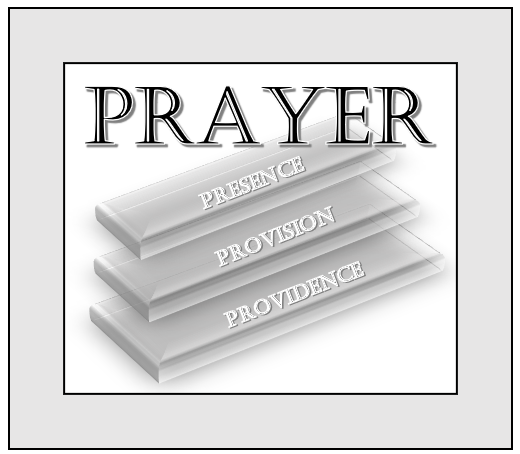
HOW TO FINISH YOUR PRAYER
This is important, but not difficult.
You can simply say Amen as you finish, which means “so be it”, something that sort of sums up the certainty of the praise, the truthfulness of the statements, and the faithfulness of God.
Those who include “In Jesus’s name” are acknowledging the role of Christ as our mediator. It is not a requirement, but it is always appropriate. Jesus gave us absolute permission to ask in his name. When we make this statement, we are expressing our desire that our prayer would align with the character of Jesus. To acknowledge that Christ is our intercessor doesn’t mean we can’t approach the throne. It simply means we can ask Jesus to stand with us when we do.
Any prayer to God is to the trinitarian Father, Son, and Spirit. The Spirit enables us to pray, and Christ carries the pass as he ushers us to the throne. So the bottom line is this: Don’t worry — you can’t separate them by accident.
A blessing or doxology or Scripture passage can be spoken as you close your prayer:
- The Lord bless you and keep you;
the Lord make his face shine on you,
and be gracious to you;
the Lord turn his face towards you
and give you peace;
and the blessing of God almighty,
the Father, the Son, and the Holy Spirit,
be among you and remain with you always. Amen. (Numbers 6:24-26) - To him who loves us
and has freed us from our sins by his blood,
and has made us to be a kingdom
and priests to serve his God and Father,
to him be glory and power for ever and ever! Amen.(Revelation 1:5-6) - To you be the glory forever and ever! Amen. (Galatians 1:5)
- For Your glory, in honor of Your purposes, and according to Your will I pray. Amen.
You May Want More…
If you want to spend more time learning how to pray in public with confidence, I am thrilled.
You can actually pray Scripture. You can’t get any more pure than this!
Praying the very words of God.
When you read the Psalms, you see how possible this is — Just read those words to God as your prayer. And, the Psalms won’t be the only place to find actual prayers.
One treasured prayer in Scripture is Ephesians 3:14-20. I love it so much that I created a Scripture Memory Tool to help me work on memorizing it. You can get that by clicking on the link above, or the image below.
One favorite prayer is the words of Daniel. He and his friends were threatened with death. Daniel led them in a prayer for help, and God answered them by providing a vision for Daniel during the night. Daniel immediately blessed God and prayed his thanks.
It’s in Daniel Chapter 2, verses 20-23. (If you can remember Daniel 2:22 you can always find it.)
Blessed be the name of God forever and ever,
to whom belong wisdom and might.
He changes times and seasons;
he removes kings and sets up kings;
he gives wisdom to the wise,
and knowledge to those who have understanding,
he reveals deep and hidden things;
he knows what is in the darkness,
and the light dwells with him.
To you, O God of my fathers,
I give thanks and praise.,
for you have given me wisdom and might,
and have now made known to me what we asked of you,
for you have made known to us the king’s matter.
Thanks for coming to the porch with me. Anytime you want to relax, or think, or just have a friend, come back. Because I like you a latte.
MORE RESOURCES FOR HOW TO PRAY IN PUBLIC WITH CONFIDENCE
Would you like to explore this more? Maybe someone else says it in a way that works better for you.
There’s something you will find:
Your fears are common, normal, and have a solution.
That’s pretty good news.
One source is from Desiring God, an article about How To Pray Aloud In A Group. It is a beautiful description of prayer, and contains quite a story of courage.
From Tim Keller, we have a very eloquent description of the value of the prayers of long ago, from The Book of Common Prayer. See what he says about Praying both in public and in private. If you love those eloquent and refined words of the past, you will be delighted.
One place I have enjoyed reading during this series is Prayer and Possibilities, where Kathryn lovingly addresses the fear of Praying Out Loud with practical tips and plenty of ways to get yourself over that reluctance.
Here’s an article from Crosswalk, about a Closing Prayer After A Meeting.
And if you have thoughts about using the phrase “In Jesus’s Name” please read this post at Grace To You called Why Pray In Jesus’ Name?
Or read How Does A Person Pray in Jesus’ Name at Compelling Truth.
IS IT REALLY SO SIMPLE?
Sigh. Is anything simple? Every day I am humbled by another truth, and my shortcomings are before me. Each time I think I have discarded one, another appears in its place.
I have enjoyed the challenge of this series, examining prayer, and trying to address every obstacle in my life that keeps me from it.
How Do We Know Where To Learn?
You know what one assurance has been for me? Having a trusted Bible teacher. My pastors, my group leaders, my teachers, all of these have helped me understand ways to seek out solid resources to grow my faith.
Here is an important truth: In everything we learn, we are choosing our indoctrination. We are being led by people who teach us how to think better. Choosing who leads us is paramount. And to choose our leaders, we need to know the criteria. It is cyclic, choosing a teacher to learn the criteria to choose a teacher.
The journey itself, learning, asking questions, researching, will reveal the correct path. God isn’t trying to be obscure. But your faith journey is more intellectual and more spiritual than walking to the mailbox. It’s an exploration, an adventure, and a necessary trip with an absolute destination.
Our Prayer Series So Far:
How To Pray When You Can’t Focus
How to Jump Start Your Prayer Life
How to Add Prayer To Your Busy Day
How to Pray using Prayer Methods
And now today, How to Pray in Public With Confidence.
There’s another post, with a printable list of prayers that focuses on our Nation and the Church: How To Pray For The Election.
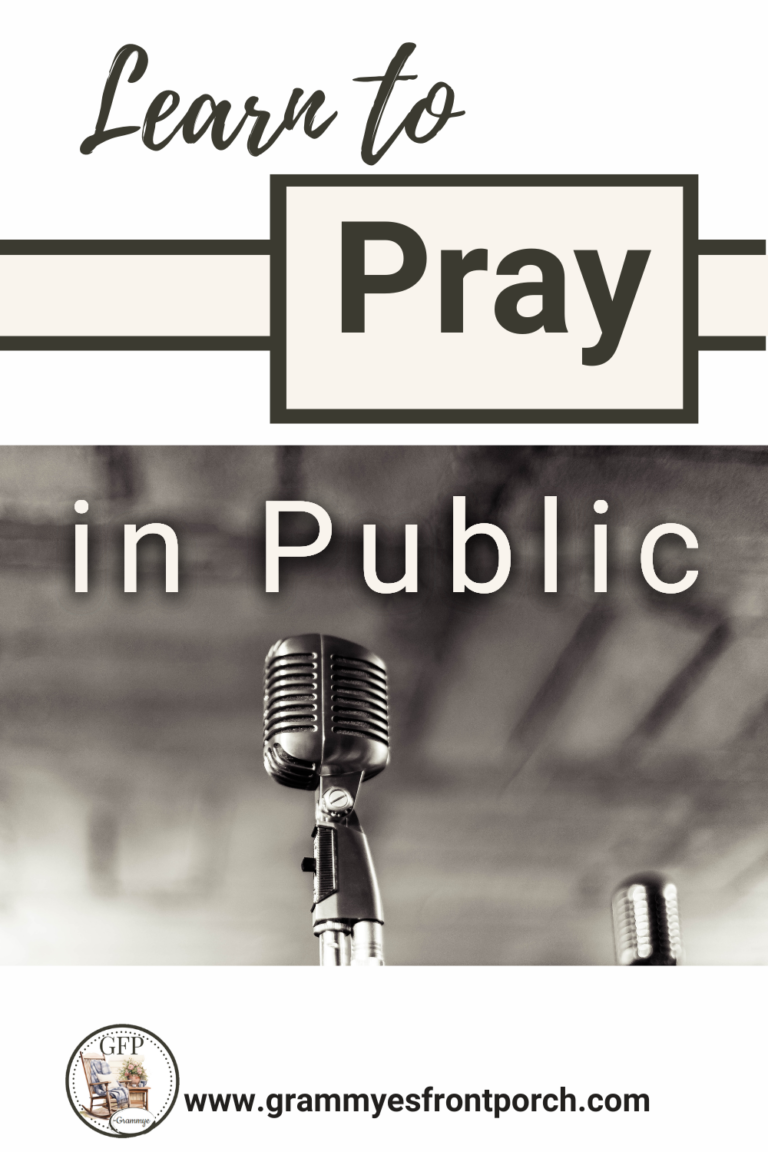
Thank you, for plodding through this with me. There is so much more to be said.
The truth is, it could go on forever.
For today, when you pray before others:
- Turn fully to God
- Acknowledge his presence, provision, and providence.
- Remember that prayer is enhanced by faithfulness.
💖 If you have something to contribute, or you found something interesting here, please leave a friendly comment and encourage the community.
Thank you for visiting! At GFP company is always welcome!




Are you on Pinterest? That is a crazy fun place! You can find so many helpful things. Take a look at what I’ve saved for you! A lot of things that never make it to the blog. Here are my Pinterest pins, and I have lots of categories/boards if you’re looking for something specific.
-Grammye
New here?
I’m Grammye, and I’m collecting and sharing ideas that can help you embrace the life you have.
When things are difficult, come here to refresh and relax. We’ll have coffee and talk.

You’re invited
to the neighborhood of GFP.
Accept by signing up
and I’ll send you a letter right away.
Subscribing to GFP is just like getting a magazine. Except it’s free! You won’t be asked for any payment information.
So say yes, then check your junk/spam mail in case the confirmation gets lost on the way!

